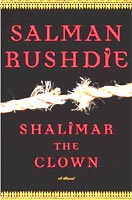|
|
| Help | |
| You are here: Rediff Home » India » Get Ahead » Leisure » Books |
|
| |||||||||||||||||||||||
|
| |||||||||||||||||||||||
Know why 'K' is silent in the word 'know'? Why, you jest, that's simple: to have kids hear it spoken as a nice two-letter word. Ah, but surely the word was spoken before it came to be written down, so what explains the extra alphabets -- a mischievous insertion?
It probably doesn't matter so long as the word's message is understood. Nor is there any sense in getting worked up over the loftiness, goofiness or craftiness of the wordsmith. Or calligraphist. Or whoever.
 To be just to Salman Rushdie's Shalimar The Clown would call for a similar application of principle. It's this novel, this work of fiction, that's up for appraisal, not the author.
To be just to Salman Rushdie's Shalimar The Clown would call for a similar application of principle. It's this novel, this work of fiction, that's up for appraisal, not the author.
And if you have the slightest trace of a subcontinental sensitivity, the book will engage you -- not just in one sense, but many, in the cascading gush of a long terrace-garden dream sequence.
Lyrical it is from the first word onwards, testifying yet again to Rushdie's ability to set off soundtracks to his prose, putting voices in your head, even as he modulates his aesthetics to the intimate demands of conflicting needs: to enrapture the reader, and to sheath his own heartbreak. Yes, it is about Kashmir. But no, not in any obsessive way ('Bustin' makes me feeeel goood,' you hear Ray Parker Jr's vocals on the first page, set in LA).
Shalimar the clown is a tightrope walker called Noman. As the cross-cultural passion of his love alliance with Boonyi the dancer (in transcendental transit, symbolic of Kashmiri cohabitation) is blown apart by forces of destiny beyond their control, he loses his mind. Boonyi falls for the liberating lure of an American Nazi-defying hero (Hum bewafa... in Kishore Kumar's elegiac voice).
In torment, Shalimar succumbs to terror, squashed as he is on one side by the 'iron mullahs' (who stir to life from all the military scrap metal), and on the other by the devotees of India as an Integral Whole (who'll have none of this subversive thinking in fractions), and ends up wreaking vengeance on the clueless evil-fighting American hero.
As allegory, it is na�ve. But this is fiction, fiction that has to be felt. Eyes that well up in tears amidst an agony too agonising to acknowledge are not eyes in search of accuracy.
That's the special attribute of the 'crackdown', at which point the music stops, precisely, even while word blurs into word in a paroxysm of literary incoherence. 'Why was that why was that why was that?' the author growls, as Pandits flee the valley.
'Who raped that woman again? Who raped that dead woman? Who raped that dead woman again?' he howls, as Shalimar's hapless village pays for his deeds ('a live wet water village' you hear Eve Ensler's quavering Bosnia monologue).
Such rage is countered best by a glower of eyes equally intent on peace, resolutely resistant to the forces of antagonism, man-made as they too are -- though Shalimar the air walker never quite achieved the elevation needed to see that for himself. Take a look at the book's cover picture (the subcontinental edition).
No redrawing of that outline, nor any hardening of it, is needed to get a glimpse of the tragic figure's message: go fuzzy. For one bit. This is the Indian subcontinent, after all. Even a standard testimony bears the sound of a debate.
Powered by
|
|
| © 2008 Rediff.com India Limited. All Rights Reserved. Disclaimer | Feedback |